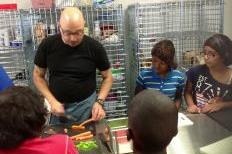






 Perez with students“Can I try?” Eli asked. As a sixth grade language arts and social studies teacher at Badger Rock Middle School, “can I try?” is not something that my students usually ask. But our class and our classroom is different today.
Perez with students“Can I try?” Eli asked. As a sixth grade language arts and social studies teacher at Badger Rock Middle School, “can I try?” is not something that my students usually ask. But our class and our classroom is different today.
Badger Rock Middle School is a charter school in Madison Metropolitan School District that was established in the 2011-2012 school year.
As a place-based charter school, our students learn about urban agriculture and sustainability. Now, in our second year, we have 50 sixth grade students and 50 seventh grade students. Next year, another class of incoming sixth graders will make this a 6-8 middle school. In August, Badger Rock moved into in a new building funded by the Center for Resilient Cities, with gardens and an instructional kitchen.
Today, the instructional kitchen is our classroom, and Eli wants to try.
Sixth graders with large knives might sound like a news headline, but no, this Tuesday morning my students are getting to learn knife skills; stemming, coring, slicing, and cubing a garden-grown bell pepper will challenge them, and force them to concentrate in ways that are different than when we are working to improve their literacy skills. The smiles that they have when they slide their almost square diced bells into the pan indicate a great sense of accomplishment. Feeling confident, they then chop onions and finely mince some garlic. They are making stuffed bell peppers. And out of 25 students, there is only one knick of a finger. I am both proud and relieved.
Next Tuesday, I get the other 25 students, and the ones that I had this week will be wading in a pond searching and cataloguing various species of macro-invertebrates at Indian Springs Park.
If you know about charter schools, then you probably have an opinion on them. Some say that they are a threat to the traditional public school system–the privatization of a publicly funded resource–and the traditional system should be maintained.
Others say that charter schools can serve students more efficiently with smaller classes and more flexible approaches to instruction. Regardless of your position, both sides believe that their side is the best way to educate children.
Obviously, as a teacher at a charter school, I am an advocate of charter schools. But my experience in schools is broad. I have taught in urban schools, suburban schools, charter schools, and independent schools on three continents. I have had students from over 50 countries in my classroom, who have had 150 different home languages, and what is important to me, is that my students practice the three R’s–Reading, ‘Riting, and Reasoning.
How will the teachers at Badger Rock balance the demands of accountability through testing, with the true engagement that place-based, project learning can offer?
How can I improve the reading performance of my students, 75 percent of whom are currently reading below grade-level, anywhere from first grade to high fifth grade, with one less day in the classroom?
You see, Tuesdays are spent outside of the classroom. We explore the parks to learn about diversity in trees and insects. We plant. We harvest. We cook. When we do these things, I see debate, thinking, synthesis and analysis. Yet, what I see in the field will not be measured by the Wisconsin Knowledge Concepts Examination (WKCE). Our school will be challenged to meet the performance standards that are in place for us. If we do not meet them, we can be closed; that’s what happens to poorly performing charter schools -- they are shuttered.
While the challenges are substantial, I have to ask, "Can I try?"
This is the first column from community contributor and Badger Rock Middle School teacher Stephen Perez. He will post monthy on Madison Commons.
|
|
|
Welcome to the Madison Commons, a website designed to provide news and information about all of Madison's neighborhoods and a crossroads for the discussion of community issues. The name comes from the idea of a village commons, a place for news, talk, debate, and some entertainment, too, that's open to everyone.
All rights reserved. Read more about the Madison Commons and its partners.

